- Home
- Robert Rankin
The Mechanical Messiah and Other Marvels of the Modern Age Page 4
The Mechanical Messiah and Other Marvels of the Modern Age Read online
Page 4
‘Luck?’ queried Lord Andrew Ditchfield, who could see no luck at all.
‘That I am already on the scene, as it were. Even now the London bobbies will have been alerted and will be on their way. Commander Case of Scotland Yard will probably take immediate charge of this one. A thorough fellow he is, to be sure. Although perhaps at times too thorough. He would no doubt wish to preserve the crime scene for as long as possible. Days, weeks, months, who can say? The Electric Alhambra would have to remain closed throughout this protracted period.’
Lord Andrew groaned dismally.
‘What joy,’ said Cameron Bell.
‘Joy?’ queried his lordship, throwing up his flapping hands.
‘What joy will be seen upon the face of Commander Case when he finds that there is an aristocrat involved. He is presently flirting with this new political fashion known as Bolshevism. What was it I recently heard him say? Oh yes —”Come the revolution, aristocrats will be first up against the wall.” A foolish fellow at times. But a great friend, and one who will take my advice.’
‘I will write out a contract,’ said Lord Andrew, ‘employing you from this very moment.’
‘As luck would have it,’ said Cameron Bell, producing a cream vellum envelope from an inner pocket, ‘I have one of my own with me. I will just fill in the financial details and then you can sign it.’
Commander Case took command of the situation. He arrived at the Electric Alhambra minutes later. In the company of numerous police constables and several members of the press. Including the Society columnist of The Times.
He was greeted in the foyer by Cameron Bell.
‘Ah,’ puffed Commander Case, a lean and wiry individual with the looks of a whippet and a love for utter control. ‘You, Bell, who invited you here?’
‘I witnessed the entire event,’ said Cameron Bell. Who once more held a champagne bottle in one hand and a glass in the other. It was not, however, the same champagne bottle. Rather it was a magnum of superior vintage, fresh from the electrical refrigerating cupboard in Lord Ditch-field’s suite of rooms. ‘Care for a swift glass or two of the bubbly stuff, before you depart?’
‘I suspect that I shall remain here for some considerable time,’ said Commander Case. ‘And, as you know full well, I never drink on duty.’
‘Duty?’ Cameron Bell made a certain face. ‘I see the hacks of Grub Street are hard upon your heels once more. I recall, to our shared horror, the liberties they took with you regarding the pronouncement you made in the case of Doctor Hill, the Putney Poisoner.’
Commander Case turned bitter eyes upon Mr Cameron Bell. ‘You got me out of that one, right enough,’ he conceded.
‘And this one also, if you will allow me to conduct the investigation in my own manner, unhampered—’
‘Unhampered?’ Commander Case raised his eyebrows.
‘Slip of the tongue,’ said Cameron Bell. ‘Naturally I meant unassisted.’
‘Naturally you did.’
‘I saw the whole thing happen,’ said the private detective, sipping upon his champagne, ‘and I will be pleased to conduct the investigations entirely alone and with only the minimum of expense to the Metropolitan Police Force.’
‘Minimum expense?’
‘Travel costs and other sundries. Trifling fancies, really.’
‘And—’
‘I will report my findings directly to you and when the case is successfully concluded, you may take full credit. What say you to this?’
There was a moment. A significant moment. And both men knew the significance of this moment.
Commander Case put out his hand and Cameron Bell then shook it. The nature of the handshake was also significant.
‘Champagne?’ said Cameron Bell, with a smile.
‘Certainly,’ said the commander.
6
he clinking of champagne glasses was not to be heard in the unstarred communal dressing room. The chattering of teeth and the knocking of knees and the rattle of pewter hip flask’s neck against the plywood dentures of Peter Pinkerton. Surely.
But not the clinking of champagne glasses.
The turns were in a state of some distress.
Jugglers jiggled nervously and kiwi birds, exhibiting that mysterious sixth sense that their kind are noted for, discerned a palpable danger and used their chameleon—like skills to blend in with the fixtures and fittings. The sounds of chattering teeth, knocking knees and juggler jigglings were interspersed with cries and curses as folk tripped over the kiwi birds.
There was chaos, there was fear and there were theories.
‘I saw it happen from the wings,’ wailed one of the Travelling Formbys. ‘He was consumed by the fire of the Almighty.’
“Tis true as my brother tells it,’ his brother agreed. ‘:Tis punishment for the sins of all the artistes.’
Another Travelling Formby, although exactly which one it was — as they all looked so alike — none could say, put in his three-pennyworth, too.
‘Let us pray for salvation,’ he cried, ‘for which of us sinners will be next?’
Peter Pinkerton advanced another opinion, no less apocalyptic, but perhaps a tad more optimistic. He had recently become a Jehovah’s Witness and so knew with utter conviction that the world was due to end in a matter of months.
‘It is the Rapture,’ he intoned, ‘when the good will be taken up.
Tony Spaloney waggled his fingers and wobbled a bit on his heels. He was now somewhat gone with the drink and as such he had plenty to say. ‘Murdering Martians,’ he began. ‘Bombed out me pie, eel and mash shop, they did. And me poor Aunty Doris was strewn to the four winds. Nothing left but ‘er stays and ‘er old battered bonnet.’ He was a cockney, was Tony.
Peter Pinkerton said, ‘All the Martians are dead.’
‘I’ll not argue with that,’ cried Tony Spaloney. ‘But think on this. We all knows there’s ghosties, don’t we? Anne Boleyn, as walks the Bloody Tower, with ‘er ‘ed tucked underneath ‘er arm.
Peter Pinkerton nodded. Where was this going? he wondered. And shouldn’t he be going? Far away from here?
‘Martin ghouls!’ shouted Tony Spaloney, making the camouflaged kiwis more restless. ‘The ghosts of dead Martians, exacting a ‘ideous revenge upon all ‘umankind. What we needs ‘ere is an exorcist, not no ruddy policemen.’
Some heads nodded, some shoulders shrugged.
“Tis the wrath of God,’ bawled a Formby. ‘The wrath of God is upon us.
‘Please calm yourself, young sir.’ Colonel Katterfelto finally rose from his seat to take command. ‘It was not the wrath of God. You may have my assurance on that.’
A wailing Formby squared up before the colonel. But the old campaigner had twenty-five years of military service and the command of men to his account. He fixed the Formby with a baleful eye.
‘I’m sorry,’ the Formby snivelled. ‘But how can you know for sure?’
‘Because I know how he was killed,’ said the colonel.
This brought a sudden silence to the communal dressing room.
A silence that was almost all-consuming. Broken only by a rhythmic crunching sound. Of Darwin munching peanuts.
‘I know how he was killed,’ said the colonel once more. ‘Then I would very much appreciate it if you would enlighten me.’
Colonel Katterfelto turned at the sound of this voice, to view a fellow standing in the open doorway.
‘Cripes alive,’ said Tony Spaloney. ‘It’s only Mr Pickwick.’
Cameron Bell sighed softly. ‘Cameron Bell,’ said he. ‘I am the investigative officer assigned to this case. I was making my way to the scene of the crime when I overhead this heated conversation.’
‘Wrath of God,’ a Formby whispered, and merged amongst his brothers.
Cameron Bell would have doffed his top hat, but he had left it, for reasons of his own, along with his umbrella, in Lord Andrew Ditchfield’s lofty apartments.
‘Any help that anyone can offer in this tragic affair will
be very much appreciated. And well rewarded, too,’ said the private detective.
‘The ghosts of Mars,’ said Tony Spaloney. ‘You can have that for a quid.’
Cameron Bell smiled politely. ‘I would be interested to hear what Colonel Katterfelto has to say.
‘Ah,’ gruffed the colonel. ‘You know me name. Assume you caught me act.’
‘An unappreciative crowd,’ said Cameron Bell, diplomatically. ‘You certainly foxed them with your—’ The private detective gestured with his champagne glass towards the goggles that adorned the colonel’s headwear. ‘I would dearly love to purchase a pair of those.’
‘I’m keeping mine.’ The colonel added a huff and a puff to his gruffing.
‘Quite so.’ Cameron Bell offered up the warmest of smiles. ‘But I would be grateful to hear your theory regarding the untimely death of Mr Harry Hamilton.’
‘Gun,’ said the colonel. ‘He was shot.’
‘Gun?’ said the private detective, his warm smile sinking away.
‘Space gun.’ The colonel tapped at his holster. ‘Ray gun, man. I should know, I’ve fired a few in me time. Hunted big game on the Martian steppes. Used to lead safaris for the gentry, after the Martian Menace was brought to an end. Bagged great three-legged beasties. But zap and blat—’ The colonel mimed cocking and shooting. ‘Reduce a man to atoms in the twinkling of an eye. It was a ray gun took poor Harry Hamilton. Take my word as a fact.’
‘Interesting.’ Cameron Bell raised bottle to glass. And then became aware that all stares that were aimed in his general direction had now specifically affixed themselves to the magnum of champagne.
‘Would anyone care to join me in a glass of bubbly?’ asked Mr Bell.
But then he caught his breath. For from behind the curtain that screened off the female artistes’ area stepped the lovely Alice Lovell. She wore a black silk kimono, smothered in floral motifs, and a cloche cap of the very latest fashion.
‘Did I hear someone mention champagne?’ she asked.
The champagne didn’t really mend the artistes’ shattered nerves. But it did go down very well and it did give Cameron Bell the chance to breathe in Alice Lovell’s beauty at close quarters.
‘Do you work at Scotland Yard?’ she asked him, as he poured champagne into her out-held enamel cup. Very slowly.
‘I am a private detective,’ said Cameron Bell. ‘A consulting detective.’
‘Like Sherlock Holmes?’ said Alice. ‘My cup is now completely full,’ she added.
‘Just like Sherlock Holmes,’ said Cameron Bell.
‘He is dreamy,’ said Alice and she sighed. ‘He’s a real man. Tall and slender and so intelligent.’
Cameron Bell dwelt upon the words man and intelligent. Both certainly applied to himself he considered.
‘They should call in Sherlock Holmes,’ said Alice.
‘He is fictional,’ said Cameron Bell, toasting Alice with his glass.
‘Of course he’s not.’ Alice laughed a most enchanting laugh. ‘I have a good friend, a decent, honest working girl, employed to pamper Lady Windermere’s pussy. Such a friendly little cat. She says that Sherlock Holmes took care of a very delicate matter for her ladyship.’
‘Ah now, well, indeed,’ said the most private detective.
Cameron Bell was enjoying himself most deeply and the artistes of the communal dressing room were most deeply enjoying his champagne. For he had ordered two more magnums be brought down from above by the trembling liveried menial, whom Lord Andrew had ordered not to leave the building. The private detective knew, however, that he should hasten to the scene of the crime to begin his investigations.
He thanked the artistes for their theories and their company, then took and kissed the hand of Alice Lovell. An act of daring that he would certainly never have accomplished sober. He then told all and sundry, man and woman, kiwi and monkey alike, that he would do everything in his power to bring this sorry matter to a speedy conclusion. Then bade his farewells to all.
‘And give my regards to Sam Weller,’ called a Formby, who had not previously spoken and was altogether uncertain as to what was actually going on.
The footlights were off, but the stage was still well lit. Cameron Bell stepped gingerly onto this stage. It was as if he was making his entrance. And although the great auditorium was now empty and all was still and silent, he felt that he was now the star turn and that this was somehow his moment.
Cameron Bell took deep and steadying breaths. Brought out his pince-nez, perched them on his nose. He strode to the centre of the stage, then paused. And mused for just a moment more. One could not help but be overwhelmed by this. The scale and splendour of it all and that special something that all true performers sense when they tread the boards. It is passion and reality, it is fear and excitement, it is all that show business in its many forms embodies. And it touched the very soul of Cameron Bell.
For he was in his way a performer, and he could understand.
The private detective shrugged off with difficulty the feelings that pressed upon him and applied himself to his profession. For it was not sufficient that he should merely see the aftermath of what had happened. He should see more.
He stood now where Harry Hamilton had and gazed all around and about. He squinted up to darkness and dwindling perspective. Much machinery was there to be seen. Cogs and pistons, ratchets and chain—wheels. Mechanisms for raising and lowering backdrops, shifting scenery and ‘flats’. There were lighting gantries and complicated gadgetry. Much that could possibly pour down electrical death upon an unlucky performer. Was this but an accident? wondered Cameron Bell. But no, he had sensed otherwise. He had discerned purpose behind this killing. This was not the whim of fate. This was murder most foul.
Cameron could feel it in his bones.
But how?
The ray-gun hypothesis held to a certain charm. An assassin with some terror weapon, hidden somewhere— Cameron peered through his pince-nez. Any one of many many places. It would be necessary to search every box and every balcony and seat for a clue.
However. Cameron turned his gaze to the stage before him.
An all-but-circular scorch mark, with an outer ring of spattered blood. A far from pretty sight.
Cameron Bell affected a satisfied smile. ‘Ah,’ said he. ‘From above, then, and not from before. That makes sense. And so it did to him.
‘And you,’ said Cameron Bell. To something that had caught his attention. ‘You, I feel, will have very much to tell me.
He stooped and withdrew from within his jacket his silver cigar case. A present from a grateful head of state, for sorting out yet another delicate matter. Cameron emptied its contents into his hand, then thrust the three cigars into his top pocket. ‘Let us be having you, then,’ he said to the something.
This something lay just beyond the scorch mark and the horrid ring of blood. This something was the bandaged ‘hurty-finger’. All that remained of the late, great Harry Hamilton.
Cameron Bell now brought out a small leather wallet that contained a number of enigmatic-looking tools. Removing a less—than-enigmatic-looking pair of tweezers from this, he plucked up the remaining remains of the famous artiste.
Something fell and struck the stage, rolled a little, then came to rest. Cameron Bell placed the bandaged finger into his cigar case, then reached out with the tweezers and picked up— A golden signet ring.
Examining this closely, he thought to observe a queer and complicated sigil.
‘Ah indeed,’ said Cameron Bell. ‘Ah now, yes indeed.’
7
olonel Katterfelto had engaged theatrical diggings.
Which was to say that he had rented accommodation in a house that catered to actors and artistes. Its style had been represented to him as ‘shabby genteel’, which as the colonel knew was a euphemism for ‘rough but with running water’. As he was now in reduced circumstances and had roughed it out in far worse upon Mars and in other theatres of war, the colonel c
onsidered it comfortable enough and adequate to his needs.
Not so, however, Darwin, who felt himself to be a monkey of superior requirements, fit for far better than this.
The house itself had once been part of a proud Nash terrace that swept from Piccadilly to the park. But now it stood all alone, its neighbours hacked from it by the bombings of Worlds War Two. Great raking shores of timber supported its side walls, which appeared perilously close to collapse. Within, the floors were no longer level and the doors of the guest rooms had been cut to trapezoid shapes to accommodate themselves within their buckled frames. Windswept nights were made sleepless by the shudderings of this failing house. By the creakings and groanings and terror—stricken prayers of its tenants.
The landlady’s name was Mrs Emily Marsuple. Widow of the parish. A toothless, bearded hag who would one day be immortalised in popular song by Messrs Jagger and Richards.
She was rather taken with the colonel, who put her in mind of her dear departed husband. A purveyor of frog-skin waistcoats and toad-pelt toppers to a discerning clientele, he had come to an untimely end whilst engaged in a tadpole-eating tournament at the Royal Amphibian Club in the Mall.
The colonel never lacked for ersatz tea or brick-dust biscuits whilst in the company of Mrs Marsuple. But he kept the door to his room well locked at night.
He and Darwin were not the only tenants of this room. A policy of sharesies existed at Mrs Marsuple’s. As many beds as could be were crammed in every room. The colonel and the monkey shared their room with the brothers Britain, who specialised in being the front and rear ends of a pantomime horse.
It was nice work if you could get it and the brothers Britain could.
These two were identical twins who shared not only the same bed, but evidently the same dreams, for both were given to talking in their sleep and called out strange phrases in unison. And although Colonel Katterfelto snored through these uncanny utterances, Darwin the monkey gibbered to himself, for he found such speakings fearful.

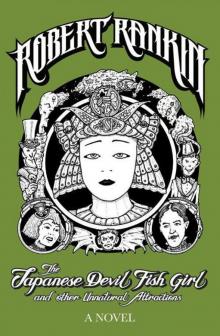 The Japanese Devil Fish Girl and Other Unnatural Attractions
The Japanese Devil Fish Girl and Other Unnatural Attractions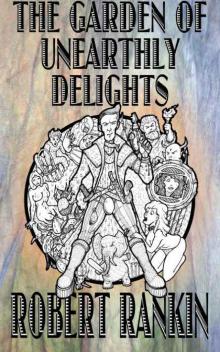 The Garden of Unearthly Delights
The Garden of Unearthly Delights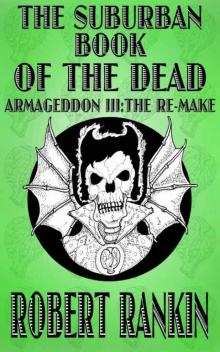 The Suburban Book of the Dead: Armageddon III: The Remake
The Suburban Book of the Dead: Armageddon III: The Remake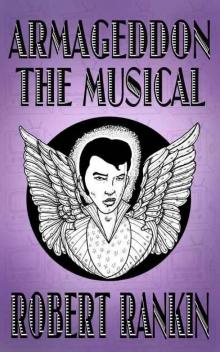 Armageddon_The Musical (Armageddon Trilogy Book 1)
Armageddon_The Musical (Armageddon Trilogy Book 1)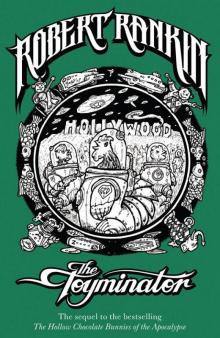 The Toyminator
The Toyminator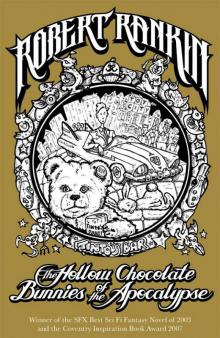 The Hollow Chocolate Bunnies of the Apocalypse
The Hollow Chocolate Bunnies of the Apocalypse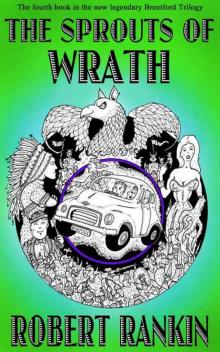 The Sprouts of Wrath
The Sprouts of Wrath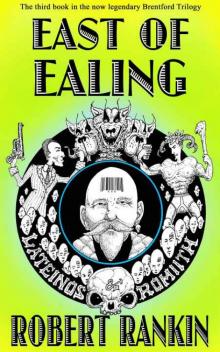 East of Ealing
East of Ealing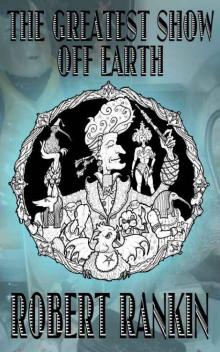 The Greatest Show Off Earth
The Greatest Show Off Earth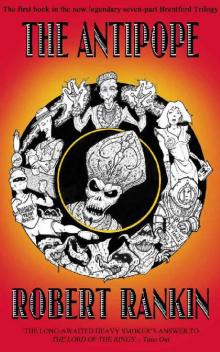 The Antipope
The Antipope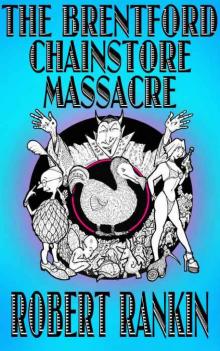 The Brentford Chainstore Massacre
The Brentford Chainstore Massacre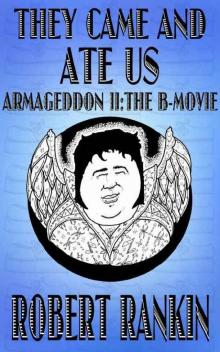 They Came and Ate Us_The B-Movie (Armageddon Trilogy 2)
They Came and Ate Us_The B-Movie (Armageddon Trilogy 2)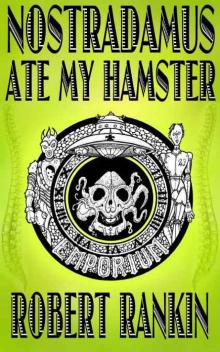 Nostradamus Ate My Hamster
Nostradamus Ate My Hamster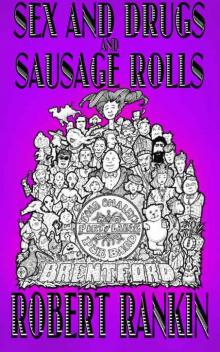 Sex and Drugs and Sausage Rolls
Sex and Drugs and Sausage Rolls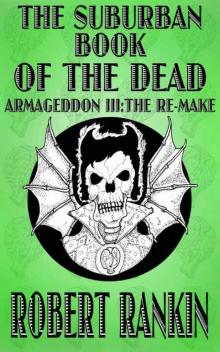 The Suburban Book of the Dead_The Remake (Armageddon Trilogy 3)
The Suburban Book of the Dead_The Remake (Armageddon Trilogy 3)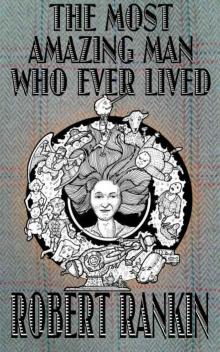 The Most Amazing Man Who Ever Lived
The Most Amazing Man Who Ever Lived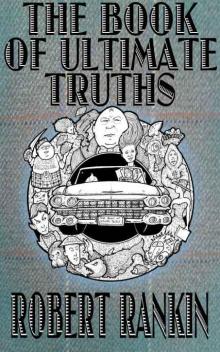 The Book of Ultimate Truths
The Book of Ultimate Truths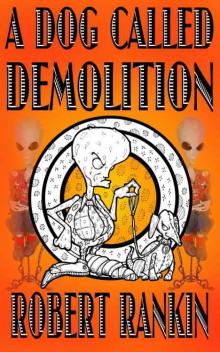 A Dog Called Demolition
A Dog Called Demolition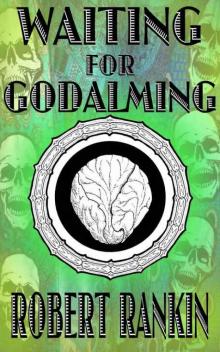 Waiting for Godalming
Waiting for Godalming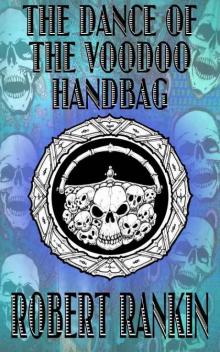 The Dance of the Voodoo Handbag
The Dance of the Voodoo Handbag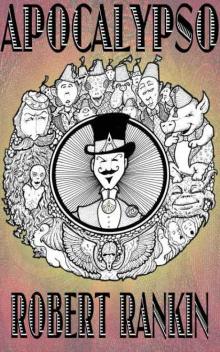 Apocalypso
Apocalypso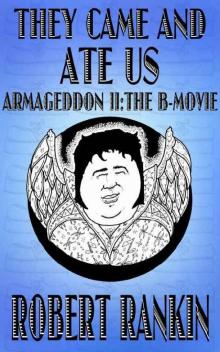 They Came and Ate Us: Armageddon II: The B-Movie
They Came and Ate Us: Armageddon II: The B-Movie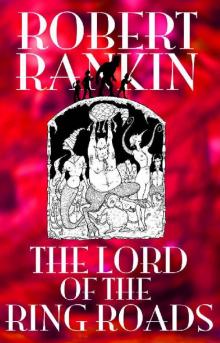 The Lord of the Ring Roads
The Lord of the Ring Roads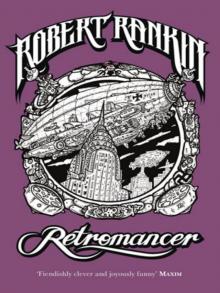 Retromancer
Retromancer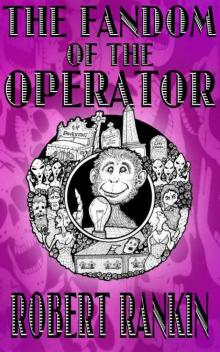 The Fandom of the Operator
The Fandom of the Operator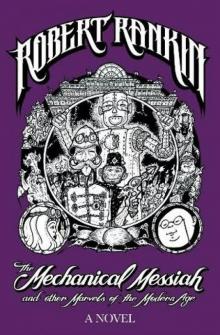 The Mechanical Messiah and Other Marvels of the Modern Age
The Mechanical Messiah and Other Marvels of the Modern Age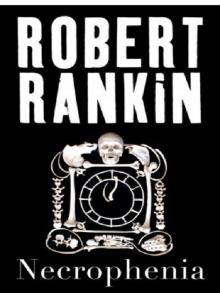 Necrophenia
Necrophenia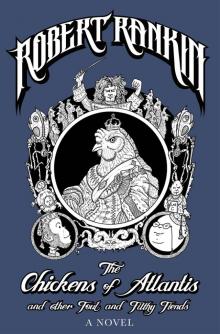 The Chickens of Atlantis and Other Foul and Filthy Fiends
The Chickens of Atlantis and Other Foul and Filthy Fiends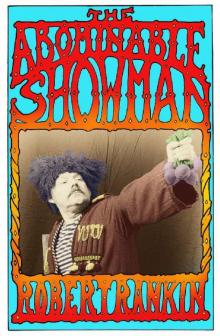 The Abominable Showman
The Abominable Showman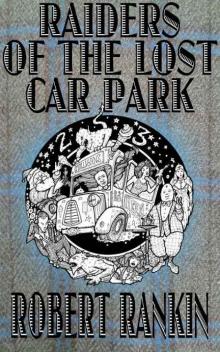 Raiders of the Lost Carpark
Raiders of the Lost Carpark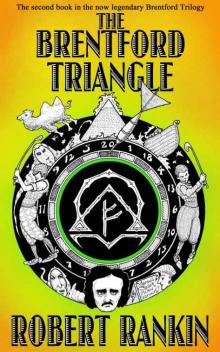 The Brentford Triangle
The Brentford Triangle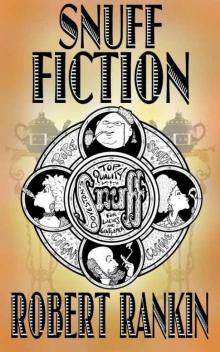 Snuff Fiction
Snuff Fiction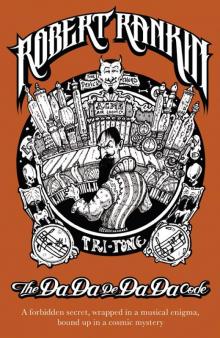 The Da-Da-De-Da-Da Code
The Da-Da-De-Da-Da Code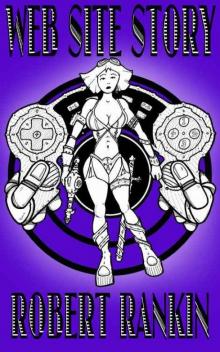 Web Site Story
Web Site Story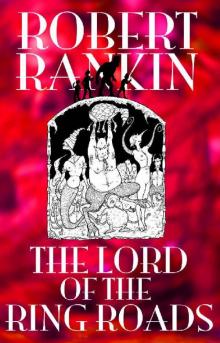 The Lord of the Ring Roads (The Final Brentford Trilogy Book 1)
The Lord of the Ring Roads (The Final Brentford Trilogy Book 1)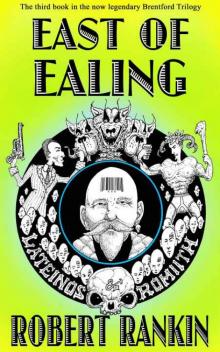 East of Ealing (The Brentford Trilogy Book 3)
East of Ealing (The Brentford Trilogy Book 3)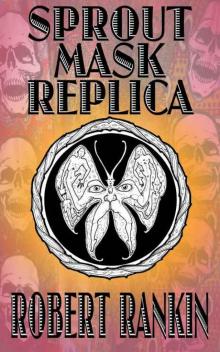 Sprout Mask Replica (Completely Barking Mad Trilogy Book 1)
Sprout Mask Replica (Completely Barking Mad Trilogy Book 1)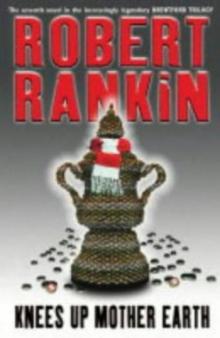 Knees Up Mother Earth bs-7
Knees Up Mother Earth bs-7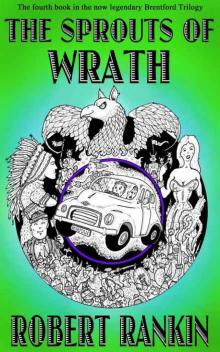 The Sprouts of Wrath (The Brentford Trilogy Book 4)
The Sprouts of Wrath (The Brentford Trilogy Book 4)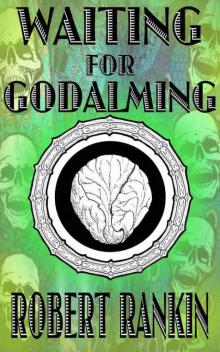 Waiting for Godalming (Completely Barking Mad Trilogy Book 3)
Waiting for Godalming (Completely Barking Mad Trilogy Book 3)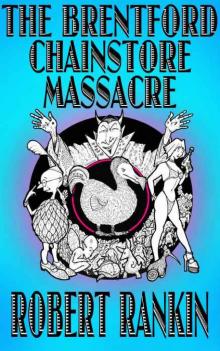 The Brentford Chainstore Massacre (The Brentford Trilogy Book 5)
The Brentford Chainstore Massacre (The Brentford Trilogy Book 5)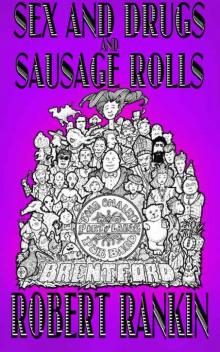 Sex and Drugs and Sausage Rolls (The Brentford Trilogy Book 6)
Sex and Drugs and Sausage Rolls (The Brentford Trilogy Book 6)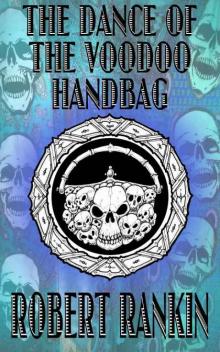 The Dance of the Voodoo Handbag (Completely Barking Mad Trilogy Book 2)
The Dance of the Voodoo Handbag (Completely Barking Mad Trilogy Book 2)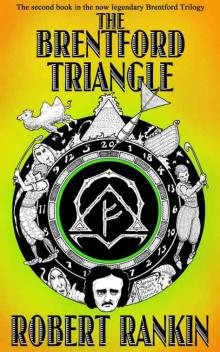 The Brentford Triangle (The Brentford Trilogy Book 2)
The Brentford Triangle (The Brentford Trilogy Book 2)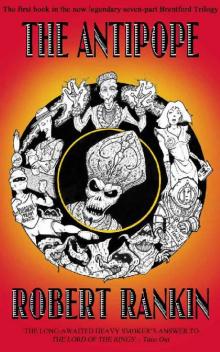 The Antipope (The Brentford Trilogy Book 1)
The Antipope (The Brentford Trilogy Book 1)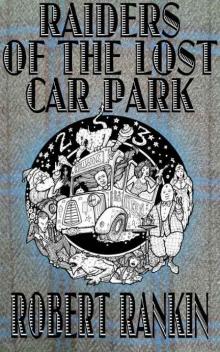 Raiders of the Lost Car Park (The Cornelius Murphy Trilogy Book 2)
Raiders of the Lost Car Park (The Cornelius Murphy Trilogy Book 2)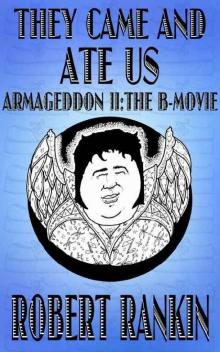 They Came and Ate Us - Armageddon II_The B-Movie (Armageddon Trilogy Book 2)
They Came and Ate Us - Armageddon II_The B-Movie (Armageddon Trilogy Book 2)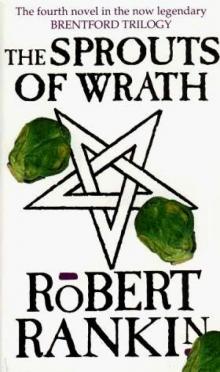 The Sprouts of Wrath bs-4
The Sprouts of Wrath bs-4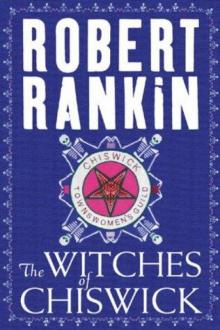 The Witches of Chiswick
The Witches of Chiswick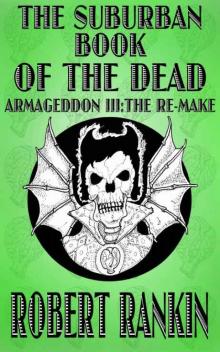 The Suburban Book of the Dead - Armageddon III: The Remake (Armageddon Trilogy 3)
The Suburban Book of the Dead - Armageddon III: The Remake (Armageddon Trilogy 3)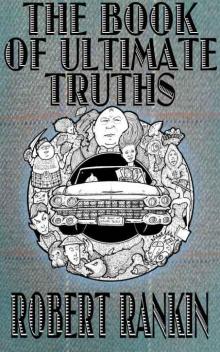 The Book of Ultimate Truths (The Cornelius Murphy Trilogy 1)
The Book of Ultimate Truths (The Cornelius Murphy Trilogy 1)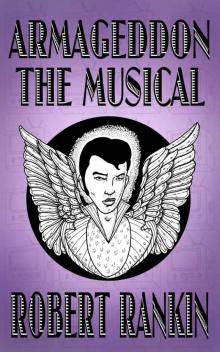 Armageddon: The Musical (Armageddon Trilogy)
Armageddon: The Musical (Armageddon Trilogy)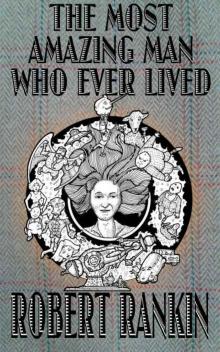 The Most Amazing Man Who Ever Lived (The Cornelius Murphy Trilogy Book 3)
The Most Amazing Man Who Ever Lived (The Cornelius Murphy Trilogy Book 3)